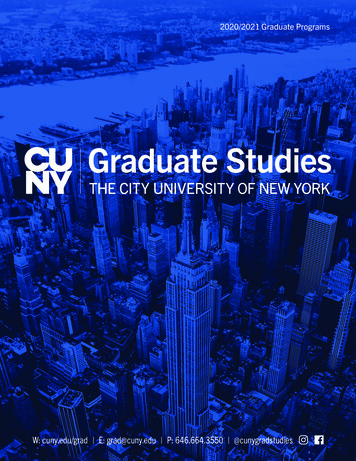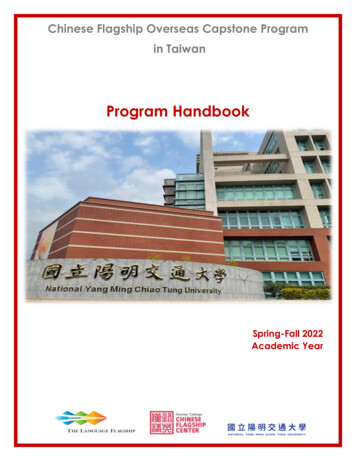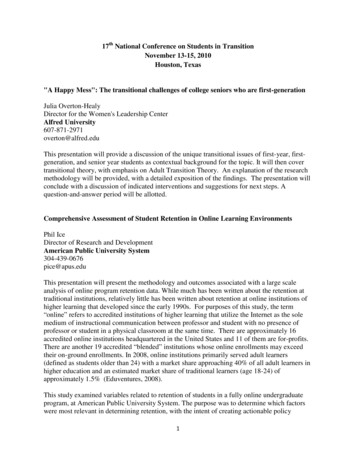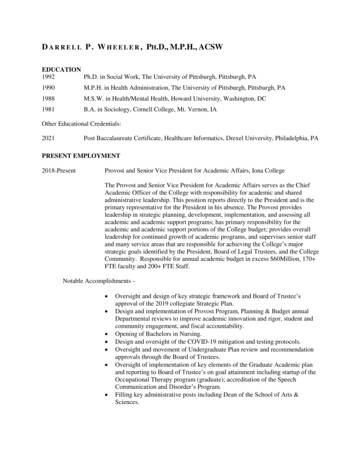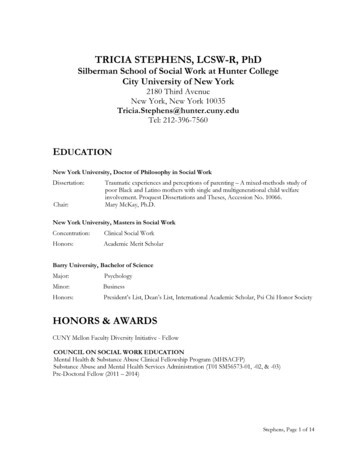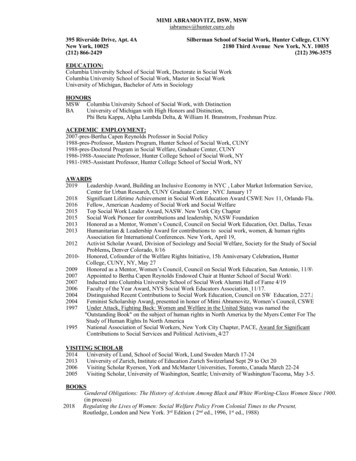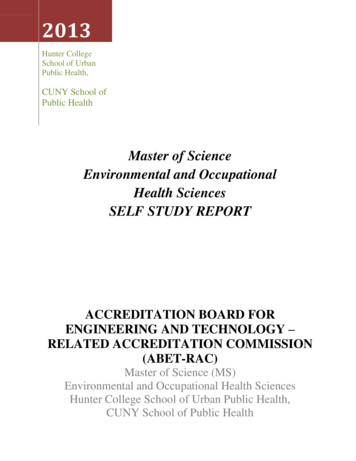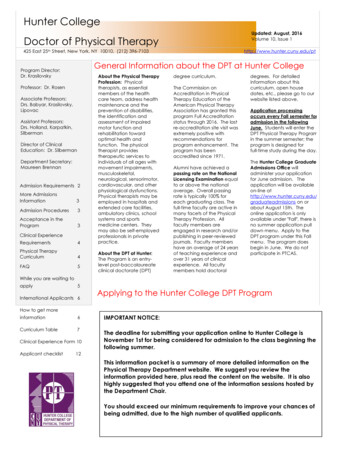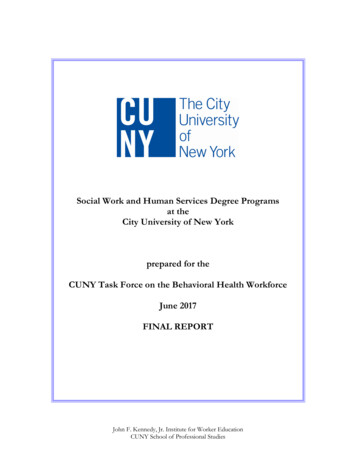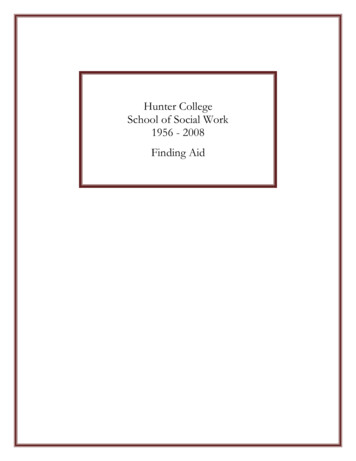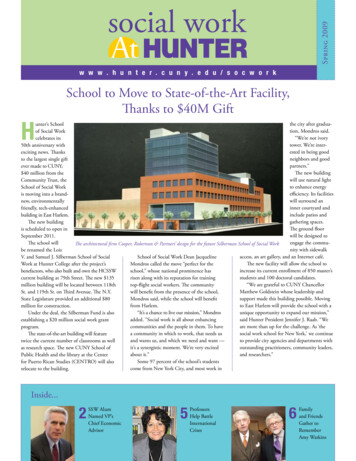
Transcription
Spring 2009social workw w w . h u n t e r . c u n y . e d u / s o c w o r kHSchool to Move to State-of-the-Art Facility,Thanks to 40M Giftthe city after graduaunter’s Schooltion, Mondros said.of Social Work“We’re not ivorycelebrates itstower. We’re inter50th anniversary withested in being goodexciting news. Thanksneighbors and goodto the largest single giftpartners.”ever made to CUNY,The new building 40 million from thewill use natural lightCommunity Trust, theto enhance energySchool of Social Workefficiency. Its facilitiesis moving into a brandwill surround annew, environmentallyinner courtyard andfriendly, tech-enhancedinclude patios andbuilding in East Harlem.gathering spaces.The new buildingThe ground flooris scheduled to open inwill be designed toSeptember 2011.engage the commuThe school willThe architectural firm Cooper, Robertson & Partners’ design for the future Silberman School of Social Worknity with sidewalkbe renamed the Loisaccess, an art gallery, and an Internet café.School of Social Work Dean JacquelineV. and Samuel J. Silberman School of SocialThe new facility will allow the school toMondros called the move “perfect for theWork at Hunter College after the project’sincrease its current enrollment of 850 master’sschool,” whose national prominence hasbenefactors, who also built and own the HCSSWstudents and 100 doctoral candidates.risen along with its reputation for trainingcurrent building at 79th Street. The new 135“We are grateful to CUNY Chancellortop-flight social workers. The communitymillion building will be located between 118thMatthew Goldstein whose leadership andwill benefit from the presence of the school,St. and 119th St. on Third Avenue. The N.Y.support made this building possible. MovingMondros said, while the school will benefitState Legislature provided an additional 80to East Harlem will provide the school with afrom Harlem.million for construction.unique opportunity to expand our mission,”“It’s a chance to live our mission,” MondrosUnder the deal, the Silberman Fund is alsosaid Hunter President Jennifer J. Raab. “Weadded. “Social work is all about enhancingestablishing a 20 million social work grantare more than up for the challenge. As ‘thecommunities and the people in them. To haveprogram.social work school for New York,’ we continuea community in which to work, that needs usThe state-of-the-art building will featureto provide city agencies and departments withand wants us, and which we need and want —twice the current number of classrooms as welloutstanding practitioners, community leaders,it’s a synergistic moment. We’re very excitedas research space. The new CUNY School ofand researchers.”about it.”Public Health and the library at the CenterSome 97 percent of the school’s studentsfor Puerto Rican Studies (CENTRO) will alsocome from New York City, and most work inrelocate to the building.Inside.2SSW AlumNamed VP’sChief EconomicAdvisor5ProfessorsHelp BattleInternationalCrises6Familyand FriendsGather toRememberAmy Watkins
Biden Appoints Hunter Grad to TopAdvisory Post in the White HouseMessage from the PresidentIt is my pleasure to inform you about what is probably the most significant news in the50 years of the Hunter College School of Social Work. Thanks to the largest single giftin CUNY history — 40 million from the Community Trust — construction will soonbegin on our new home, a state-of-the-art building in East Harlem. The New York Statelegislature provided an additional 80 million, the largest infusion of public fundingfor Hunter since the addition of the East and West Buildings at the 68th Street campusin the mid-1980s.Occupying the block between 118th St. and 119th St. on Third Avenue will allow us to expand our mission andbe a force for change in the living laboratory of East Harlem, where we will establish partnerships with communitybased social service providers to have a direct and immediate impact on the lives of the neighborhood’s residents. Itwill also enable us to address New York City’s health crises through an interdisciplinary alliance with CUNY’s newSchool of Public Health at Hunter, which will also be located in the building.It is because of the legacy of our graduates that this project is possible. We want to thank all of you for continuingto care for the future of New York.Jennifer J. Raabsocial and economic injustices they faced.“Today, I’m amazingly fortunate to beable to address those injustices at the highestlevel of government. I wouldn’t be here hadI not started on this path at the HunterSchool of Social Work.”Bernstein said he fondly recalled Professor Emeritus George Getzel and the lateProfessor Roselle Kurland. “The values theyimparted are with me today,” Bernstein said.“Hunter School of Social Work was whereI first started making connections betweenmicro and macro, between the challengesless advantaged people face in their everyday lives and the larger policy environmentin which they live,” Bernstein wrote. “Myprofessors were consistently interested inboth. The models we learned about werenever person-centric, but they never got tooabstract, leaving the person behind.”A CNBC commentator, Bernstein haswritten many books, including Crunch:Why Do I Feel So Squeezed? (And OtherUnsolved Economic Mysteries) and All TogetherNow: Common Sense for a Fair Economy.Bernstein holds a PhD in social welfarefrom Columbia.Jared Bernstein (2nd from left) meets in theOval Office with Treasury Secretary TimothyGeithner, White House Press Secretary RobertGibbs, National Economic Council DirectorLawrence Summers, Council of EconomicAdvisors Chair Christina Romer, Office ofManagement and Budget Director PeterOrszag, and President Obama.Hunter Alumna Named NYC Family Services CoordinatorMessage from the DeanThis newsletter reflects Hunter’s exceptional legacy in social work education. Our pastis represented by the retirement of Florence Vigilante, one of the school’s most admiredteachers and clinical practitioners. The present is told in the stories of our new facultymembers, and in the important contributions being made by our graduates JaredBernstein at the White House and Marianne Schretzman in city government, and bythe community organizing class of 1999, who continue to selflessly raise scholarshipsupport in memory of Amy Watkins.IThe promise of our future is expressed in our new state-of-the art building in East Harlem, a result of the historicaland ongoing generosity of the Silberman family and the New York Community Trust and the commitment ofHunter and CUNY to strengthen HCSSW as the premier school of social work.As alumni, I know you join me in my admiration for our illustrious past, pride in the vibrancy of present facultyand students, and enthusiasm for living our future with agencies, organizations, and residents as we prepare tomove to East Harlem.Jacqueline B. Mondros2 social workVice President Joseph Biden hasnamed Jared Bernstein (MSW ’86)as his chief economic advisor.“Jared Bernstein is an acclaimed economist and a proven, passionate advocate forraising the incomes of middle-class families,”Biden said when making the announcement. “His expertise and background in awide range of domestic and internationaleconomic policies will be an invaluable assetto the Obama-Biden Administration.”“It’s an honor to have him on my team,”Biden added.Bernstein, formerly of the EconomicPolicy Institute, is an expert in income disparity, low-wage labor markets, and povertyissues. During the Clinton Administration,from 1995 to 1996, he was deputy chiefeconomist for the Department of Labor.Bernstein says he has great memories ofHunter: “Some of my most meaningful andlasting experiences came from the caseworkand group work I did,” Bernstein wrote inan email. “I vividly remember my first cases,and while I fear I didn’t help [the clients]much, I can absolutely assert that theyhelped me learn, firsthand, about theHunter AlumniIn Public Servicen these trying economic times, New YorkCity’s needy children, families, and adultscan look to the leadership of MaryanneSchretzman (MSW ’86), a Hunter School ofSocial Work alumna and professor namedby Mayor Michael Bloomberg as family services coordinator for the City of New York.In her new position, Schretzman willmanage cross-agency collaborations toenhance social services provided by the city.“Maryanne Schretzman has a longstanding commitment and an accomplishedcareer working with our city’s most vulnerable residents,” Bloomberg said. “Now morethan ever, we need to ensure that New York’sfamilies are getting the services they need.Maryanne will help make sure that oursafety net remains strong.”Shretzman said her challenge is to prioritizecity services amid a 4 billion city budgetdeficit to “meet the needs of people in distress.”She said she continues to benefit fromher relationship with Hunter, and plans tokeep teaching the administration course shehas taught since the late 1990s.“The students help me more than I helpthem,” she said. “They give me ideas andthe truth about what’s going on at the streetlevel. It’s a great class.”Hunter’s “most meaningful impact,”she said, is to teach the value of socialwork. “The work of a social worker is not afrivolous matter. It requires a juxtapositionof knowing and caring for oneself whiledeveloping those mysterious bonds of understanding with others that allow for healing.”And Hunter plays an important role inhelping the city, she stressed.“Hunter embraces the values that gohand in hand with making New York Citysuch a responsive place for people withneeds, for people suffering from mentalillness, and for thosesuffering from social andeconomic injustice,” she said.“It’s a time for socialworkers, who always giveso much,” she continued.“Just as you think you’vegiven everything you have,you have to be more thanyou think you can be, anddo more than you thinkyou can do.”Schretzman previouslyserved as deputy commissioner for the Division of Policy and Planningat the Department of Homeless Servicesand as deputy assistant commissioner at theAdministration for Children’s Services. Sheearned her doctorate in social welfare fromthe CUNY Graduate Center.social work3
“For young children, typically the caretakeris the gatekeeper for the receipt of services,”Cavaleri said, adding, “When the caretakerhas his or her own mental-health issues, itcompounds the problem.”Cavaleri earned an MSW and PhD at NewYork University. In addition to studying depression in new and expectant mothers, shehas done clinical work with young childrenwith behavior disorders.It is estimated that 26 percent of childrenneed mental-health services, including40 percent of the children in low-incomecommunities, Cavaleri said. She added thathalf of these youngsters never get treatment,and three-quarters drop out of treatmenttoo early.Stigmas, perceptions, and bad experiencesin the realm of mental-health treatment areall problems, Cavaleri said.AssistantProfessor NancyGiunta bringsan expertisein aging toHunter. Thejob of long-termsenior care oftenfalls on familymembers, andthere’s a need to focus on those caretakerswho will need support, Giunta said.With the maturing of baby boomers, thenumber of U.S. seniors will probably morethan double, from 30 million in 2000 to anestimated 75 million by 2030.“Preparing home- and community-basedservices for older adults is needed. Rightnow policies are focused on consolidatingand cutting services instead of preparingfor the increased demand and need forsuch services,” Giunta said.Giunta teaches research methods, community organizing, and social planningand policy. She is the recent recipient ofa prestigious research fellowship from theHartford Foundation Geriatric SocialWork Initiative. The grant will fundGiunta’s work with the East Side Management Consortium of East Harlem and theUpper East Side to determine the benefitsof collaboration between agencies. She is afaculty fellow at the Brookdale Center forHealthy Aging and Longevity. She earnedan MSW and PhD from the University ofCalifornia-Berkeley.“I feel so lucky to be at Hunter,” Giuntasaid. “What I love about the school isthe rich diversity, experience, and talentsbrought by the students.”ProfessorMichael A.Lewis is anadvocate forthe poor andco-founderof the U.S.Basic IncomeGuaranteeNetwork(USBIG), acooperative of academics and activists thatseeks to establish a minimum salary in orderto ameliorate poverty.“The current welfare system is more concerned with enforcing work than helping thepoor, and I think that’s bad,” Lewis said.Lewis teaches social policy and has writtenabout income-support policy, civic engagement, and social networks. He also worksas a statistician for researchers.Lewis was formerly a community organizerin East New York, Brooklyn. He earnedan MSSW at Columbia and a PhD at theCUNY Graduate Center.Faculty NewsFaculty NewsYoung children,mothers, andpregnantwomen oftendon’t get themental-healthcare they need,and that’s theprimary focusof study forMary Cavaleri,new assistant professor of social work.Cavaleri is working on developing community-based interventions to increase accessto treatment and services.4 social workSchool of Social Work Goes GlobalMeet Our New FacultyDeborah L.Tolman ispaving newground in thestudy of genderand sexuality,bringing anexcitingexpertise tothe doctoralfaculty at theSchool of Social Work.The founding director of San Francisco’sCenter for Research on Gender and Sexualityand former professor of sexuality studies atSan Francisco State, Tolman will also teachcourses on research methodology.Tolman calls sexuality the “elephant inthe room” in relation to social work. “Thereisn’t a lot of elaborated work on sexuality insocial work, but sexuality is an element ofwhat every social worker comes in contactwith,” Tolman said.Mixing qualitative and quantitative researchmethods and devising effective ways to wingrants are other areas of expertise Tolmanbrings to Hunter. “When doing research,methods are your tool. My goal is to expandthe students’ tool box,” she said. “You’re onlyas good a researcher as the questions you canask and answer.”Tolman holds a doctorate in human development and psychology from Harvard. Herbook Dilemmas of Desire: Teenage Girls Talkabout Sexuality (Harvard University Press,2002) was awarded the 2003 DistinguishedBook Award from the Association forWomen in Psychology.With projects and partnerships inNigeria, Vietnam, and PuertoRico — and development of a vitalinternational protocol for use in nationaldisasters and wars — the School of SocialWork is taking its expertise overseas.To address the critical needs of distressedchildren in Nigeria, Professor Darrell Wheeler, along with professors Willie Tolliver andAntonio Young, is using a 250,000 grantfrom the American International HealthAlliance to train Nigerian social workers incase management, leadership, and other skillsneeded for the care of orphans and vulnerablechildren.The program hopes to expand thecapacity of the Federal University ofSocial Work, Enugu, and the Universityof Nigeria to help children with HIV.Hunter is partnering on the project withthe Nigerian Social Work Association of theUnited States, Howard University’s School ofSocial Work, and alumnus Boniface Eze ofthe Nigerian Social Work Association.“The goal isn’t for the Americans to comein and say, This is how you should do it,’”Wheeler said. “Our hope is that the partnership will build strength on both sides.”Also involved in international projects isProfessor Martha Bragin, who was one of 28people worldwide chosen by the U.N. InterAgency Standing Committee to developguidelines on how humanitarian assistanceshould be administered during conflicts andnatural disasters.Bragin said she is proud to representHunter on the high-profile international”— Nancy GiuntaDr. Martha Bragin (r) has traveled the worldto help establish best practices in dealing withvictims of armed conflict and other emergencies.interests of our faculty. Our students areremarkably diverse. Our clients are diverse.It only makes sense for the city’s premiersocial work school to be involved in international scholarship.”Dr. Darrell Wheeler (l) enjoys visiting withNigerian officials on a project to help theplight of orphans.EAP Founder Florence Vigilante Retires“I feel so lucky tobe at Hunter. What I loveabout the school is therich diversity, experience,and talents brought bythe students.committee. The guidelines have been delivered to a large number of governmental andnongovernmental agencies, from UNICEFto local police organizations, that respondto emergencies. At a conference to be heldin Beijing in May, Bragin will present theguidelines and discuss how they should betaught to social workers.These guidelines are “a standard ofpractice for the protection of small children,”Bragin said, adding, “It’s essential to keepchildren from getting separated from thefamily at all costs, even when people aregetting chased with knives.”For instance, she said, police can bedirected to tag babies when families arefleeing an emergency.Bragin has long been involved in international efforts. Since 1995, she has workedto help Vietnam develop a social-workprofession after the switch from communismto a market economy.This impetus for her work, she said,came from Vietnamese officials who wantedto protect children during the economictransition.Efforts are also underway at Hunter todevelop a partnership with the Universityof Puerto Rico to collaborate on issues ofdisability and autism-spectrum disorder.“We will look for opportunities toengage in research and training between thetwo institutions, and hope for an exchangeof scholars,” Professor Wheeler said.Wheeler emphasized that the international initiatives are a logical step for Hunter.“I think it’s a reflection of the scholarlyDean Mondros (l) thanks Dr. FlorenceVigilante for four decades of service.Hunter bid a heart-felt farewell toDr. Florence Vigilante, who retiredat age 81 after 42 years at the Schoolof Social Work.“Hunter has been a glorious experiencefor me,” said Vigilante, a casework professor.“I greatly enjoyed working and continuallylearning in an academic environment. And Imade wonderful friends.”Vigilante came to the school in 1967 asan admissions interviewer and soon becameDirector of Admissions. In 1983, she createdthe school’s Employee Assistance Programto provide free counseling for Hunter employees, their families and significant others.She also was the chairperson of the caseworksequence, a post she held for 18 years.And Vigilante is the longtime senior editorof the Journal of Teaching in Social Work.In retirement, Vigilante said she’s looking forward to having time to write aboutHunter’s EAP program, and she’d like toteach part-time.She belongs to a group at Mt. SinaiHospital that is exploring the service needsof people who live past 70, a phenomenonmore common today.“A group of us is living longer. As thisoccurs, we need to explore the kinds ofservices needed, and, importantly, to recognize that those needs change over time.”social work5
On the tenth anniversary of the murderof much-loved Hunter graduatestudent Amy Watkins, the School ofSocial Work is celebrating the tremendouseffort by Hunter students, faculty, andadministration to keep her dream alive.Watkins, a Kansas native, was studying toget her MSW and working as a communityorganizer with domestic violence victimsin the Bronx. On March 8, 1999, as shewas returning to her apartment in ProspectHeights, Brooklyn, she was fatally stabbedin the back during an attempted robbery.The tragedy stunned the school and madenational headlines. Days later, 300 marchersheld a candlelight vigil on her street.Watkins’ Hunter classmates were notabout to let her drift into obscurity. Agroup of eight fellow community-organizingstudents formed a scholarship committee2009: The Year of theCommunity OrganizerWhen Americans learned BarackObama was once a communityorganizer in Chicago, many(including Republican vice-presidentialcandidate Sarah Palin) were confused.What’s a community organizer?This is a gnawing question for socialworkers. But Obama changed all that,said SSW Dean Jacqueline Mondros.“People didn’t get it. They donow, folks!” Mondros said at the AmyWatkins Scholarship Committee event.Applications to Hunter’s communityorganizing program are up 75 percent,from 103 applications last year to 180this year — for 40 places. Hunter hasthe largest community-organizingprogram in the country, Mondros said.Indeed, community organizers arethat hard-to-define mix of social workersand activists, folks who believe thatorganization and action are needed toaddress society’s ills.“I’m a community organizer,”Mondros said. “When people used toask my dad what I did, he’d say, ‘Shemakes trouble.’”6 social workSSW Alums Pursue Careers in GovernmentFounders, winners, and supporters of the Amy Watkins Scholarship Fund gathered atHunter to celebrate Watkins’ life and the work of the committee. From left: alumnaeDeb Bernardino, Mindy Fernandez-Sheinbaum, Katie Magee, Chana Widawski;Prof. Steve Burghardt; this year’s recipient, Jessica Hall; alumnae Angelica Oteroand Sarah Morrison; and Dean Jacqueline Mondrosunder the tutelage of their professor, Dr.Stephen Burghardt.“We expected to see her in class and insteadheard she was knifed to death. We were intotal shock,” said Chana Widawski, a founding member of the committee. “But we’resocial workers. We turn shock and anger intoaction, and that’s what we did.”Burghardt said he told the group tostart slowly. “They said, ‘No way,’ and raised 25,000 that first year.” The group has raisedmore than 90,000 for an annual community-organizing scholarship to Hunter, including two gifts totaling 20,000 from YokoOno. On March 24, the committee held atenth-anniversary commemorative fundraising event at Hunter.Burghardt said the diverse people who’vecome out to support the committee represent“a belief about what our America can be.”“It’s a belief that, yes, our America canbe about a multiracial, multicultural world,”Burghardt added. “This is what Amy created,the possibility of what our world can be.”Brooklyn District Attorney Charles Hynes,whose office prosecuted the two young menwho committed the crime, called the murder“tragic.” But, he added, “I’m sure Amy islooking down and very proud of what’shappened in her memory.”Watkins, 26, dedicated her life to socialjustice and was passionate in her work tocombat poverty, violence, and discrimination.She continues to inspire. Students from AcornHigh School for Social Justice in Brooklynattended the anniversary event. They hadformed an anti-violence group after watchinga segment about Watkins on NY1.Larry Watkins, Amy’s father, said he couldsee his daughter represented in the room.“She was never condescending. She lookedup to everyone, even children,” he said.This year’s scholarship winner is JessicaHall, a first-year community-organizing student. Hall is a social work intern at Projectfor Return of Opportunity in Veteran’s Education (PROVE). She works with homelesspeople in her Lower East Side neighborhoodand volunteers to help youth caught in thejustice system.“It’s really about keeping her legacy alive,”Widawski said. “We wanted to rememberAmy’s life, and not her death. We want thefocus to be on her incredible vision.”The committee now hopes to raiseenough money to provide full scholarships,instead of partial ones.“There’s a dearth of scholarships for socialwork,” Widawski said. “This profession we’vechosen, there’s not a lot of money in it.”The Hunter CollegeSchool of Social Work129 East 79th StreetNew York, NY 10075Tel: 212.452.7085Fax: 212.452.7197www.hunter.cuny.edu/socworkCity University of New YorkMatthew Goldstein, ChancellorHunter CollegeJennifer J. Raab, PresidentHunter College School of Social WorkJacqueline B. Mondros, DeanThe City University of New YorkMarc Cherna (MSW ’78) is a recipientof the University of Pittsburgh’s Instituteof Politics Coleman Award for Excellencein Community Service. The ColemanAward recognizes outstanding communityleaders for their contributions to theWestern Pennsylvania region. Chernahas been the director of the AlleghenyCounty Department of Human Servicesfor 10 years.BethanyJankunis(MSW ’99)has beennamed toCity HallNewspaper’s“Top 40Under 40:The NextGeneration of Political Leaders in NewYork” for 2008. Jankunis is the chief ofstaff for Assemblymember Deborah Glick.Jankunis received her law degree fromFordham University, where she was theStein Public Interest Scholar.Gary Parker (MSW ’00) is director ofgovernment and community affairs forNew York University. He advocates onthe city and state levels for student aidand money for research and developmentprojects.Scott Stringer. She works with communityorganizers to engage Manhattanites on suchissues as housing, schools, and transit.JennySobelman(MSW ’06)is the newdirector ofstate legislative affairsfor the NYCDepartmentof Education.Sobelman represents 1,452 public schools,a 17 billion annual budget, and 140,000employees. “I have MSW on my businesscards. I’m very proud to be a social workerin politics,” Sobelman said.Jesse R.Bodine(MSW’07) is thedirector ofconstituentservices andpolicy forNew YorkCity Councilwoman Gale Brewer. Bodine helped withthe effort to battle the bedbug epidemic inNYC. He is now helping Brewer work on ratcontrol issues. Previously, Bodine internedfor State Senator Liz Krueger.Michael Meade (MSW ’05) is deputy chiefof staff for State Senator Eric Schneiderman.Meade says he was always interested insocial justice and community organizing,so working in politics is a “great fit.”Jihoon Kim (MSW ’08) works for StateSenator Eric Schneiderman as a communityliaison to the Upper West Side. Kim works oneducation, transportation, and disability issues.Jessica Silver (MSW ’05) is deputy director of community affairs and constituentservices for Manhattan Borough PresidentYuvelqui Rivera (MSW ’08) serves asconstituent services coordinator in StateSenator Eric Schneiderman’s office, whereshe handles a large volume of case work.Katrina Butler (MSW ’09) is a sentencingadvocate for the Brooklyn Defender Services, a not-for-profit that provides indigentdefense. She helps clients obtain servicesafter they are arrested.Class NotesScholarship NewsLegacy of SSWStudent Lives OnMichael Meade (MSW ’05), YuvelquiRivera (MSW ’08), and Jihoon Kim(MSW ’08) work for State Senator EricSchneiderman, a Democrat representingthe Upper West Side, West Harlem,Washington Heights, Inwood, MarbleHill, and Riverdale.In MemoriamFrances Keyes Porter (’37) died onNovember 11, 2008, at age 93. Sheworked for many years as a socialworker and teacher after graduating from Hunter. In the late 1940s,Porter ran an orphanage in Alaska.HCSSW Introduces Center for Advanced Clinical EducationThe School of Social Work is launching the Center for Advanced Clinical Education (CACE) to meet the educational needs of professionalsocial workers. CACE offers continuing N.Y. State certificate programs in individual therapy, family therapy, and social work administration,as well as special classes and events. The first course offerings are Co-occurring Disorders: Integrated Practice Across Professional Lines andTrauma-Informed Practice: Applying Trauma Knowledge in Multi-cultural and Multi-problem Treatment. For enrollment information, contactdirector Judith B. Rosenberger at judith.rosenberger@gmail.com or 212.452.7044.Submit a Class Note to news@hunter.cuny.edusocial work7
NON-PROFIT ORG.U.S. POSTAGEPAIDAUGUSTA, MEPERMIT NO. 121The Hunter College School of Social Work129 East 79th StreetNew York, NY 10075Hunter’s School of Social Work Top-Ranked NationallyThe Hunter School of Social Workwas ranked in the Top 10 nationallyin the Winter ’09 issue of the Journalof Social Work Education.The rankings came soon after HunterCollege was named No. 8 in the nationamong “Best Value” public colleges for2009, according to The Princeton Reviewand USA Today.Hunter’s doctoral program in socialwork, offered in conjunction with theCUNY Graduate Center, was ranked fourthin the nation, while the MSW program wasranked seventh. The article graded graduateschools by selectivity — how many studentsapply, how many are selected, and howmany of the selected students choose toattend that school. It also provided rankingsbased on publication rates and reputation.“This is really good news,” said DeanJacqueline Mondros. “It shows you howstrong we are compared with other schools.”For years, national rankings for schoolsof social work were based on opinions fromdeans and on other subjective markers. “Itwas a popularity contest without any basisof data,” Mondros said.In the selectivity ranking, NYU’s MSWprogram came in 72nd; its PhD program,31st. Columbia’s MSW program was ranked89th; its PhD program, 19th.The new benchmarks are part of aneffort by the National Association of Deansand Directors of Schools of Social Work to create a more rigorous national assessment system.Hunter’s PhD program admitted 30percent of its applicants, and 87 percentof those accepted chose to attend Hunter.Along with the University of Iowa, this wasthe highest enrollment rate of any school.For MSWs, Hunter accepted 35 percent,with 67 percent of those students attending.N ational R ankings by S electivity *MSW programs4.5.6.7.Southern Connecticut StateUNC, Chapel HillUniversity of UtahHunter College8. Rhode Island College9. Portland State10. UCLAPhD programs4.5.6.7.Hunter CollegeUniversity of California at BerkeleyUCLAUniversity of Pennsylvania8. University of Washington9. UNC, Chapel Hill10. Case Western Reserve1. San Francisco State2. University of California at Berkeley3. Brigham Young1. University of Michigan2. University of Chicago3. Washington University* “Picky, Picky, Picky: Ranking Graduate Schools of Social Work by Student Selectivity,” Journal of Social Work Education, Winter 2009
School of Social Work is moving into a brand-new, environmentally friendly, tech-enhanced building in East Harlem. The new building is scheduled to open in September 2011. The school will be renamed the Lois V. and Samuel J. Silberman School of Social Work at Hunter College after the project's benefactors, who also built and own the HCSSW
